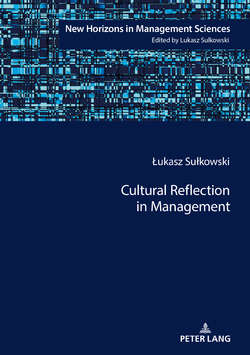Cultural Reflection in Management

Реклама. ООО «ЛитРес», ИНН: 7719571260.
Оглавление
Lukasz Sulkowski. Cultural Reflection in Management
About the author
About the book
This eBook can be cited
Contents
Introduction
1 Cultural trend in management. 1.1 The development of the cultural trend in management
2 Paradigm of functionalism in organizational culture. 2.1 The functionalist understanding of culture in management
2.2 Elements of organisational culture
2.3 Models of organisational culture
2.4 One-dimensional typologies of organisational culture
1 Weak culture – strong culture
2 Positive culture – negative culture
3 Bureaucratic culture – pragmatic culture
4 Introvert culture – extrovert culture
5 Conservative culture – innovative culture
6 Hierarchical culture – egalitarian culture
7 Individualist culture – collectivist culture
2.5 Multidimensional typologies of organisational culture
2.6 A 3D model and typology of organisational culture
1 Hierarchy – equality
2 Individualism – community
3 A high tolerance for uncertainty – a low tolerance for uncertainty
2.7 Functions of organisational culture
2.8 Critical opinions of the functionalist approach to culture in management
3 Culture of society in management. 3.1 Comparative cross-cultural studies
3.2 Significance of cultural circles
3.3 The cultural conditions of competitiveness
3.4 Convergence of cultures
3.5 Modern consumerist culture
4 Culture and organisational culture from the neoevolutionary perspective. 4.1 Neoevolutionism in management science
4.2 Culture from the neoevolutionary perspective
4.3 Memes and culture
4.4 The evolutionary roots of organisational culture
4.5 Neoevolutionism and other paradigms in cultural research
5 The interpretative understanding of culture in management. 5.1 A description of the interpretative-symbolic paradigm
5.2 Concepts of symbolic interactionism in management
1 Social constructivism
2 The organisational process understood as building a social agreement
3 The cognitive role of language
4 Entanglement in praxis
5 Management as a symbolic activity
6 Qualitative methodology of the IS paradigm
5.3 Interpretative vision of culture in management
5.4 Organisation identity and organisational culture
6 The radical vision of culture in management. 6.1 Critical management studies
6.2 The critical understanding of organisational culture
6.3 Emancipation aims of cultural criticism
1 Democratisation of organisations
2 Rejection of violence through reflection of the culture
3 Methods which emancipate marginalised groups in organisations
4 Popularisation of emancipation culture
5 Anti-functionalism
6 Methodology of the critical research into culture
7 Critical methodological pluralism
8 Critical organisational culture
9 Development of humanist management projects through the radicalisation of methods
6.4 Limitations of the critical current in management
7 The cultural changeability of organisations. 7.1 Cultural conditions of organisational changes
7.2 Functionalist changed in culture
7.3 Interpretative approach to cultural changes
7.4 Emancipatory cultural changes
7.5 The metaphorical research method in organisational culture
Summary
List of figures
List of tables
Отрывок из книги
Łukasz Sułkowski
Cultural Reflection in Management
.....
The typology of weak and strong cultures is one of the most-often analysed issues of the cultural current in management. The subject literature is dominated by the belief that strong organisational culture prevails. Strong organisational culture is characterised by homogeneity, which means uniformity and common agreement among employees as to key assumptions, values and norms. Strong identification with organisational values is supposed to lead to the greater involvement of employees and, in consequence, to greater effectiveness85. Internal cultural incoherence, the manifestation of which is the emergence of subcultures or even counter-cultures, could lead to a disintegration of the organisation (Tab. 5).
Tab. 5: Strong vs. weak cultures. Source: Own work.
.....